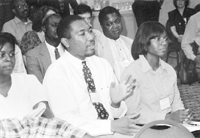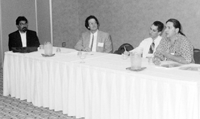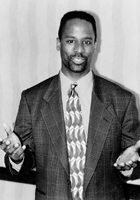Third Diversity Workshop held at SIAM's Atlanta Meeting
October 1, 1999

Most participants find the diversity workshops most valuable as an arena for presenting their work at a national meeting, in a supportive environment. Shown here are William Christian (center), who gave a talk in Atlanta on graph algorithms, and Rachel Vincent (right), both of Rice University. One Atlanta speaker reports that the experience of preparing and presenting a talk renewed her enthusiasm not only for her thesis problem, but for applied mathematics in general. A further "helpful surprise" was the opportunity to discuss her thesis problem at the meeting with a professor and a senior grad student.
The third SIAM Graduate Student Focus on Diversity workshop was held in Atlanta on May 12, the first day of the 1999 SIAM Annual Meeting. Participants in the day-long workshop heard technical talks by eight graduate students, all members of underrepresented minority groups, and a lively panel discussion on the benefits of undergraduate summer research programs. Also on the program were an informal luncheon and pizza break, and an evening forum, led by Richard Tapia of Rice University, on the graduate school experience from a minority student perspective.
Partial support for the workshop was provided by The Boeing Company, the Department of Energy, and the National Security Agency.
Ricardo Cortez, an assistant professor of mathematics at Tulane University, and Steven Lee of Lawrence Livermore National Laboratory were the co-organizers of this year's workshop. Cortez, who was one of the student speakers at the 1997 workshop (at Stanford University), is a firm believer in the "need for graduate students to find venues to present their research at national conferences." The diversity workshops provide just such an opportunity, he says.
The eight speakers in Atlanta were Charles Hardnett, Byron Jeff, and Vernard Martin, all of the Georgia Institute of Technology; William Christian and Illya Hicks of Rice University; Erika Camacho and Stephen Wirkus of Cornell University; and Monica Romeo of Brown University. The topics covered in their talks were nonlinear dynamical systems, planar graph algorithms, analysis of compile-time cache utilization, management of real-time media space applications, and construction of distributed computational laboratories.
"The workshop is beginning to shape itself based on what's been done in previous years," Cortez tells SIAM News. One addition to the program in 1999 was the panel on summer research opportunities, which Cortez would like to see repeated at future workshops. "Many students are unaware of the importance of participating" in such programs, he says.
The panelists were Juan Restrepo (University of Arizona), Pablo Negron (University of Puerto Rico), Douglas Varela (California Institute of Technology), and Stephen Wirkus. Each brought knowledge of a different undergraduate research program to the panel, says Steven Lee; together, they emphasized the benefits of such programs to undergraduates, "especially their effective-ness in developing computer science skills, mathematics skills, and research training in preparation for graduate school."

A valuable addition to the program in Atlanta, according to workshop co-organizer Ricardo Cortez of Tulane University, was a panel discussion of the benefits of summer undergraduate research programs.

Steven Lee of Lawrence Livermore National Laboratory, co-organizer of the Atlanta workshop.
"Being that the workshop is associated with SIAM," says William Christian of Rice University, "it is an excellent way to meet minority and majority researchers from the mainstream mathematics community." Christian, who has attended all three workshops (Charlotte, Stanford, and Atlanta), wishes that "there was a way to get more students to attend."
Asked about the benefits to participants, he cites "the opportunity to give talks in a comfortable environment and just the enormous networking opportunities in the workshop and the meeting." In agreement was Erika Camacho, who found the workshop most beneficial for the opportunity to present her research "to a big audience of mathematicians and other scientists." Such events, she believes, are extremely important for minority students, allowing them "to meet other minority students, to realize that there are people with similar backgrounds and similar experience doing/studying the same things." She found the evening forum valuable because "it gave us the opportunity to express our thoughts, fears, experiences, etc., as minority grad students. I particularly like the fact that there were other PhD Latinos present."
For Rachel E. Vincent of Rice University, the workshop was a chance to meet and interact with minority faculty and students from other universities, and to get an idea of the work they're doing. Assessing the workshop as "informative and encouraging," she would happily attend another one at a future SIAM meeting.
Monica Romeo of Brown University considers such workshops "key" events in the lives of minority students. The open, integrated atmosphere of the workshop (that is, in terms of seniority as well as race) was distinctly encouraging!" Romeo explains.
It seems clear that the diversity workshops, held every other year since 1995 at SIAM annual meetings, have provided valuable experiences for minority students and postdocs. Several respondents offered ideas for improving the experience. Co-organizer Ricardo Cortez recommends that SIAM "find ways to ensure that minority undergraduate students attend in large numbers." He also believes that speakers should be encouraged to return and speak at subsequent workshops, thereby becoming more effective role models and providing continuity from year to year. A few participants wondered whether spreading the events over two days might make the workshop more advantageous, giving those attending the workshop more opportunity to benefit from the SIAM meeting itself.
The SIAM board and council have encouraged the organizers of the 2000 SIAM Annual Meeting, to be
held in July in Puerto Rico, to break the every-other-year pattern and hold a diversity workshop at that
meeting. Margaret Wright, who as SIAM president in 1995 was the driving force behind the Charlotte
workshop, is now turning her attention to Puerto Rico, beginning with a search for co-organizers for the
event. Further details are sure to follow!

